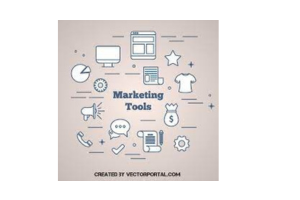Exploring the Power of Digital Marketing Tools: Boosting Efficiency and Effectiveness
In today’s digital age, businesses have a plethora of tools at their disposal to enhance their digital marketing efforts. These tools are designed to streamline processes, improve efficiency, and maximize the effectiveness of marketing campaigns. Let’s delve into the importance of digital marketing tools and how they can empower businesses to achieve their goals.
- Analytics and Tracking Tools:
Accurate data analysis is the backbone of successful digital marketing. Tools like Google Analytics provide valuable insights into website traffic, user behavior, and conversions. These analytics tools enable businesses to understand their audience, identify trends, measure campaign performance, and make data-driven decisions. By leveraging analytics tools, businesses can optimize their strategies, refine their targeting, and enhance overall marketing effectiveness. Digital Marketing Mastery can be gained via courses provided by training institutes.
- Social Media Management Platforms:
Social media platforms have become indispensable for businesses to connect with their audience and build brand presence. Social media management tools like Hootsuite, Buffer, or Sprout Social streamline the process of managing multiple social media accounts, scheduling posts, and analyzing engagement metrics. These tools allow businesses to maintain a consistent social media presence, engage with their audience effectively, and monitor brand mentions and conversations in real-time.
- Email Marketing Software:
Email marketing remains a powerful tool for nurturing leads, driving conversions, and fostering customer loyalty. Email marketing software, such as Mailchimp or Constant Contact, helps businesses automate and manage their email campaigns. These tools offer features like email templates, segmentation, personalization, and analytics to optimize email marketing efforts. With email marketing software, businesses can deliver targeted and personalized messages, track campaign performance, and drive customer engagement.
- Search Engine Optimization (SEO) Tools:
SEO plays a vital role in increasing online visibility and driving organic traffic. SEO tools like SEMrush, Moz, or Ahrefs provide insights into keyword research, competitor analysis, backlink analysis, and website optimization. These tools help businesses identify opportunities for improving search engine rankings, optimizing website content, and monitoring keyword performance. By leveraging SEO tools, businesses can stay ahead of the competition, enhance their online presence, and attract quality organic traffic.
- Content Management Systems (CMS):
A robust content management system is essential for efficiently managing and publishing content on websites or blogs. Platforms like WordPress, Drupal, or Joomla offer intuitive interfaces, customizable templates, and seamless content publishing capabilities. CMS tools empower businesses to create and manage engaging content, optimize for SEO, and enhance user experience. With a user-friendly CMS, businesses can consistently deliver high-quality content to their target audience.
- Pay-per-Click (PPC) Advertising Platforms:
PPC advertising is a powerful tool for driving targeted traffic to websites. Platforms like Google Ads and Bing Ads provide businesses with the ability to create and manage PPC campaigns. These platforms offer features like keyword research, ad creation, bid management, and analytics. By leveraging PPC advertising tools, businesses can reach their target audience effectively, control ad spend, and measure the ROI of their campaigns.
- Marketing Automation Software:
Marketing automation tools, such as HubSpot or Marketo, enable businesses to automate repetitive marketing tasks, nurture leads, and track customer interactions across multiple channels. These tools streamline lead generation, email marketing, customer segmentation, and personalized messaging. With marketing automation, businesses can deliver timely and relevant content, optimize lead nurturing, and drive conversions more efficiently.
Conclusion:
Digital marketing tools are invaluable assets for businesses looking to maximize their online presence and drive results. By leveraging analytics and tracking tools, social media management platforms, email marketing software, SEO tools, content management systems, PPC advertising platforms, and marketing automation software, businesses can enhance their efficiency, improve targeting, and optimize their overall marketing strategies. Social media for entrepreneurs can help grow their businesses and elevate the landscape of brand reach. The key lies in identifying the right tools for specific goals and leveraging their capabilities to achieve desired outcomes. In the ever-evolving digital landscape, embracing digital marketing tools is essential for businesses to stay competitive, engage their audience, and drive growth in the digital realm.

